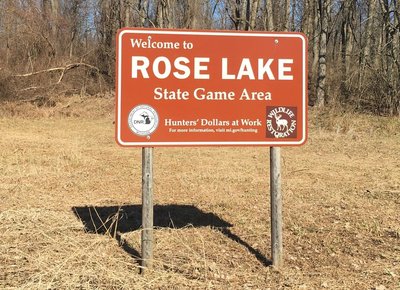
Rose Lake State Game Area in Bath Township near Lansing, Michigan. Image: Trail Run Project.
By Kristia Postema
National declines of hunting license sales and the need for additional wildlife conservation funding have prompted proposals to fill the fiscal gap, including one that’s stalled in Congress despite bipartisan support.
Hunting license sales have helped pay for federal and state wildlife conservation efforts for nearly a century, but declining sales could limit such efforts if funding needs aren’t met, hunter and outdoors groups say.
According to the U.S. Fish and Wildlife Service, hunting license sales are dropped in many states, including those in the Great Lakes region.
Agency data shows that since 2012 the number of hunting licenses sold has decreased by 67,490 in Ohio, 28,733 in Indiana, 35,378 in Illinois, 51,591 in Wisconsin and 144,638 in Michigan.
However, that trend isn’t new, said John Windau, the licensing communication coordinator for the Ohio Department of Natural Resources.
“In Ohio, hunting licenses peaked in 1949 and have been declining since,” Windau said.
Nick Green, the public information officer for Michigan United Conservation Clubs, said wildlife conservation funding is a “conundrum we’ve been staring down the barrel of for several decades.”
Green said the “pay-to-play” method for hunting licenses developed in the early 1900s when the depletion of natural resources became noticeable.
“The solution was to have hunters buy licenses that fund wildlife conservation and habitat rehabilitation,” he said. “It worked for the better part of 50 years.”
According to Green, the Pittman-Robertson Act of 1937 also provides funding through federal taxes on firearms, ammunition and other hunting equipment.
“Those excess taxes are taken in using a formula and divided up to the states,” Green said.
Green said these “two layers” of funding rely heavily on hunters, but each year about 2% to 4% of hunters don’t renew their licenses.
“Hunters aren’t just paying for the white-tailed deer or turkeys that they’re hunting. They’re also paying for habitats and making sure that we have strong, vibrant grasslands in Michigan,” Green said. “Their effort and their dollar goes much further than just the consumptive use of hunting.”
Efforts to make up for lost funding are being proposed at the federal level, according to Chad Fedewa, a wildlife biologist for the Michigan Department of Natural Resources.
Fedewa said that the proposed Recovering America’s Wildlife Act would increase funding through “fines paid for violations of environmental regulations.”
Drew YoungeDyke, the manager of sporting communications for the National Wildlife Federation, said he’s hopeful the Recovering America’s Wildlife Act will become law.
The bill has been introduced in each of the past three congressional terms, he said, but has not passed.
The bill would provide states, territories and Native American tribes $1.39 billion a year for wildlife habitat projects, according to the National Wildlife Federation.
U.S. Rep. Debbie Dingell, D-Michigan, is the lead sponsor in the House.
“Right now it has a lot of momentum” and bipartisan support, YoungeDyke said.
However, there’s been no action in Washington since a public hearing by the House Natural Resources Subcommittee on Water, Oceans and Wildlife in July. A Senate version is pending in the Environment and Public Works Committee.
According to YoungeDyke, a nationwide approach is needed to assist underfunded natural resource agencies throughout the country.
Meanwhile, Michigan United Conservation Clubs is making efforts to find solutions at local levels, Green said.
“We have a public land stewardship program called On the Ground,” he said. “What we do is try to bring hunters, conservationists and nonhunters together into a habitat project.
The program also helps the public understand the important role that hunters play in wildlife conservation, he said.
“Even though you may not hunt or understand why people hunt, it’s important because that’s what pays for conservation,” Green said.